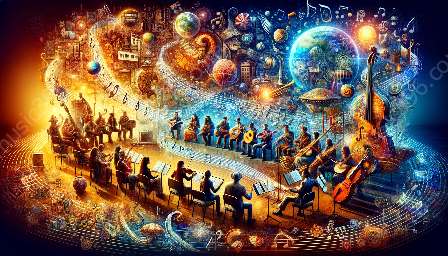Music has long been recognized as a powerful expressive medium that holds a central role in shaping cultural identity and fostering a sense of belonging. From ancient rituals and traditional ceremonies to modern-day festivals and popular culture, music serves as a potent form of communication, connection, and emotional expression. In this article, we will delve into the multifaceted relationship between music, cultural expression, and identity, considering its psychological impact and connection to different cultures.
Historical Significance of Music in Cultural Identity
Throughout history, music has been an integral part of cultural and social practices, playing a pivotal role in defining and preserving cultural identity. From indigenous tribal chants and folk songs to classical compositions and religious hymns, music has served as a reflection of diverse cultural values, beliefs, and traditions. In many societies, music has been used to pass down oral traditions, storytelling, and historical narratives from one generation to the next, creating a shared sense of identity and continuity.
Moreover, music has often been associated with specific cultural rituals and ceremonies, such as weddings, funerals, and religious observances, further solidifying its role in maintaining and expressing cultural identity. These musical traditions and practices not only serve as a means of cultural preservation but also contribute to the formation of collective memory and a sense of community.
The Psychological Impact of Music in Cultural Expression
The relationship between music and psychological well-being has been a subject of extensive research, with numerous studies highlighting its profound impact on human emotions, cognition, and behavior. When it comes to cultural expression, music serves as a conduit for the expression of complex emotions, cultural values, and societal norms. The emotional power of music can evoke a sense of nostalgia, pride, or solidarity, providing individuals with a means to connect with their cultural heritage and express their identity.
Furthermore, the psychological effects of music extend to its ability to shape perceptions, attitudes, and behaviors within a cultural context. In diverse cultural settings, music has been utilized to influence social norms, instill shared values, and promote collective identity. Whether through national anthems, protest songs, or ceremonial music, the psychological impact of music can foster a sense of solidarity and unity among individuals belonging to a specific cultural group.
Music's Connection to Culture
Music is deeply intertwined with the fabric of culture, serving as a dynamic reflection of societal dynamics, historical narratives, and communal values. Across different cultures, musical genres, instruments, and dance forms are deeply rooted in the traditions and customs of specific communities, providing a window into the socio-cultural landscapes from which they originate. From traditional folk music to contemporary pop, the diversity of musical expression mirrors the diversity of human experiences and cultural evolution.
Furthermore, the global exchange of music has contributed to the interweaving of cultural influences and the emergence of hybrid musical genres that transcend geographical boundaries. This interconnectedness highlights the transformative power of music, as it facilitates cross-cultural dialogue, mutual understanding, and the celebration of cultural diversity. The fusion of musical styles and traditions enables individuals to embrace their cultural heritage while embracing the richness of other cultural experiences.
Contemporary Perspectives on Music and Cultural Identity
In today's interconnected world, the role of music in shaping cultural identity has evolved with technological advancements and globalization. The accessibility of music through digital platforms, streaming services, and social media has led to the widespread dissemination of diverse musical expressions, enabling individuals to engage with a myriad of cultural influences and artistic innovations.
Moreover, contemporary musicians and artists often use their platforms to address social and political issues, amplifying the voices of marginalized communities and advocating for cultural diversity and inclusion. Through their music, these artists contribute to the representation and affirmation of cultural identity, challenging prevailing stereotypes and fostering intercultural dialogue.
In conclusion, music's role in cultural expression and identity is deeply intertwined with psychological impact and cultural connectivity. The historical significance of music in shaping cultural identity, the psychological impact of music in cultural expression, and the dynamic connection between music and culture collectively attest to the profound influence of music in shaping personal and collective identities. As we continue to appreciate the transformative power of music, we acknowledge its capacity to transcend boundaries, bridge cultures, and enrich the tapestry of human experience.






















